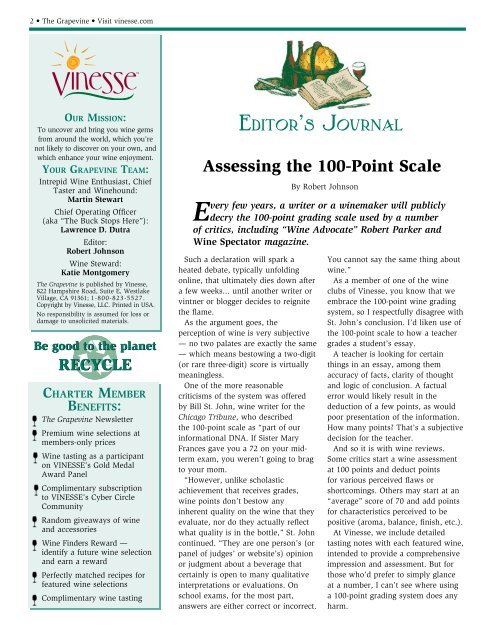Create successful ePaper yourself
Turn your PDF publications into a flip-book with our unique Google optimized e-Paper software.
2 • The <strong>Grapevine</strong> • Visit vinesse.com<br />
Our Mission:<br />
To uncover and bring you wine gems<br />
from around the world, which you’re<br />
not likely to discover on your own, and<br />
which enhance your wine enjoyment.<br />
Your <strong>Grapevine</strong> Team:<br />
Intrepid Wine Enthusiast, Chief<br />
Taster and Winehound:<br />
Martin Stewart<br />
Chief Operating Officer<br />
(aka “The Buck Stops Here”):<br />
Lawrence D. Dutra<br />
Editor:<br />
Robert Johnson<br />
Wine Steward:<br />
Katie Montgomery<br />
The <strong>Grapevine</strong> is published by Vinesse,<br />
822 Hampshire Road, Suite E, Westlake<br />
Village, CA 91361; 1-800-823-5527.<br />
Copyright by Vinesse, LLC. Printed in USA.<br />
No responsibility is assumed for loss or<br />
damage to unsolicited materials.<br />
Be good to the planet<br />
recycle<br />
Charter Member<br />
Benefits:<br />
The <strong>Grapevine</strong> Newsletter<br />
Premium wine selections at<br />
members-only prices<br />
Wine tasting as a participant<br />
on VINESSE’s Gold Medal<br />
Award Panel<br />
Complimentary subscription<br />
to VINESSE’s Cyber Circle<br />
Community<br />
Random giveaways of wine<br />
and accessories<br />
Wine Finders Reward —<br />
identify a future wine selection<br />
and earn a reward<br />
Perfectly matched recipes for<br />
featured wine selections<br />
Complimentary wine tasting<br />
Editor’s Journal<br />
Assessing the 100-Point Scale<br />
By Robert Johnson<br />
Every few years, a writer or a winemaker will publicly<br />
decry the 100-point grading scale used by a number<br />
of critics, including “Wine Advocate” Robert Parker and<br />
Wine Spectator magazine.<br />
Such a declaration will spark a<br />
heated debate, typically unfolding<br />
online, that ultimately dies down after<br />
a few weeks... until another writer or<br />
vintner or blogger decides to reignite<br />
the flame.<br />
As the argument goes, the<br />
perception of wine is very subjective<br />
— no two palates are exactly the same<br />
— which means bestowing a two-digit<br />
(or rare three-digit) score is virtually<br />
meaningless.<br />
One of the more reasonable<br />
criticisms of the system was offered<br />
by Bill St. John, wine writer for the<br />
Chicago Tribune, who described<br />
the 100-point scale as “part of our<br />
informational DNA. If Sister Mary<br />
Frances gave you a 72 on your midterm<br />
exam, you weren’t going to brag<br />
to your mom.<br />
“However, unlike scholastic<br />
achievement that receives grades,<br />
wine points don’t bestow any<br />
inherent quality on the wine that they<br />
evaluate, nor do they actually reflect<br />
what quality is in the bottle,” St. John<br />
continued. “They are one person’s (or<br />
panel of judges’ or website’s) opinion<br />
or judgment about a beverage that<br />
certainly is open to many qualitative<br />
interpretations or evaluations. On<br />
school exams, for the most part,<br />
answers are either correct or incorrect.<br />
You cannot say the same thing about<br />
wine.”<br />
As a member of one of the wine<br />
clubs of Vinesse, you know that we<br />
embrace the 100-point wine grading<br />
system, so I respectfully disagree with<br />
St. John’s conclusion. I’d liken use of<br />
the 100-point scale to how a teacher<br />
grades a student’s essay.<br />
A teacher is looking for certain<br />
things in an essay, among them<br />
accuracy of facts, clarity of thought<br />
and logic of conclusion. A factual<br />
error would likely result in the<br />
deduction of a few points, as would<br />
poor presentation of the information.<br />
How many points? That’s a subjective<br />
decision for the teacher.<br />
And so it is with wine reviews.<br />
Some critics start a wine assessment<br />
at 100 points and deduct points<br />
for various perceived flaws or<br />
shortcomings. Others may start at an<br />
“average” score of 70 and add points<br />
for characteristics perceived to be<br />
positive (aroma, balance, finish, etc.).<br />
At Vinesse, we include detailed<br />
tasting notes with each featured wine,<br />
intended to provide a comprehensive<br />
impression and assessment. But for<br />
those who’d prefer to simply glance<br />
at a number, I can’t see where using<br />
a 100-point grading system does any<br />
harm.


